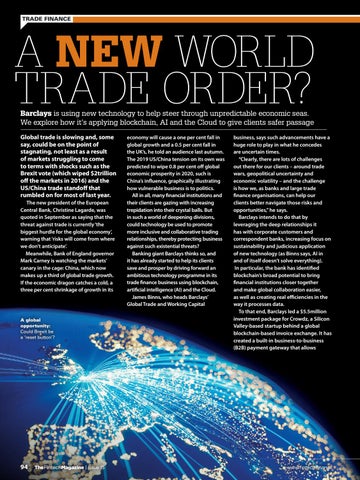TRADE FINANCE
A NEW WORLD TRADE ORDER? Barclays is using new technology to help steer through unpredictable economic seas. We explore how it’s applying blockchain, AI and the Cloud to give clients safer passage Global trade is slowing and, some say, could be on the point of stagnating, not least as a result of markets struggling to come to terms with shocks such as the Brexit vote (which wiped $2trillion off the markets in 2016) and the US/China trade standoff that rumbled on for most of last year. The new president of the European Central Bank, Christine Lagarde, was quoted in September as saying that the threat against trade is currently ‘the biggest hurdle for the global economy’, warning that ‘risks will come from where we don’t anticipate’. Meanwhile, Bank of England governor Mark Carney is watching the markets’ canary in the cage: China, which now makes up a third of global trade growth. If the economic dragon catches a cold, a three per cent shrinkage of growth in its
A global opportunity: Could Brexit be a ‘reset button’?
94
TheFintechMagazine | Issue 15
economy will cause a one per cent fall in global growth and a 0.5 per cent fall in the UK’s, he told an audience last autumn. The 2019 US/China tension on its own was predicted to wipe 0.8 per cent off global economic prosperity in 2020, such is China’s influence, graphically illustrating how vulnerable business is to politics. All in all, many financial institutions and their clients are gazing with increasing trepidation into their crystal balls. But in such a world of deepening divisions, could technology be used to promote more inclusive and collaborative trading relationships, thereby protecting business against such existential threats? Banking giant Barclays thinks so, and it has already started to help its clients save and prosper by driving forward an ambitious technology programme in its trade finance business using blockchain, artificial intelligence (AI) and the Cloud. James Binns, who heads Barclays’ Global Trade and Working Capital
business, says such advancements have a huge role to play in what he concedes are uncertain times. “Clearly, there are lots of challenges out there for our clients – around trade wars, geopolitical uncertainty and economic volatility – and the challenge is how we, as banks and large trade finance organisations, can help our clients better navigate those risks and opportunities,” he says. Barclays intends to do that by leveraging the deep relationships it has with corporate customers and correspondent banks, increasing focus on sustainability and judicious application of new technology (as Binns says, AI in and of itself doesn’t solve everything). In particular, the bank has identified blockchain’s broad potential to bring financial institutions closer together and make global collaboration easier, as well as creating real efficiencies in the way it processes data. To that end, Barclays led a $5.5million investment package for Crowdz, a Silicon Valley-based startup behind a global blockchain-based invoice exchange. It has created a built-in business-to-business (B2B) payment gateway that allows
www.fintech.finance
